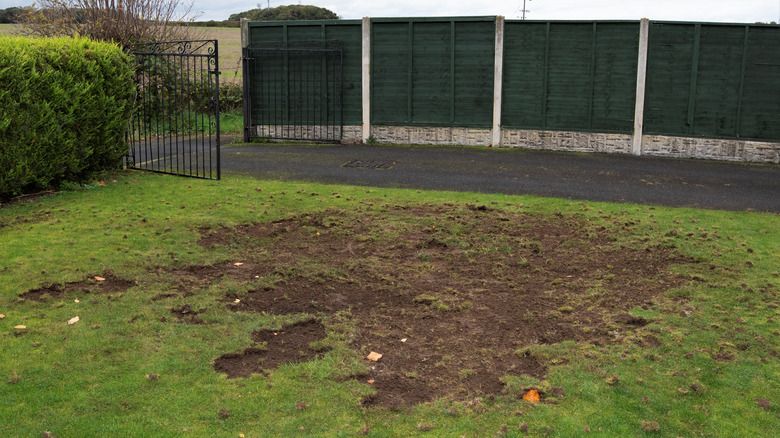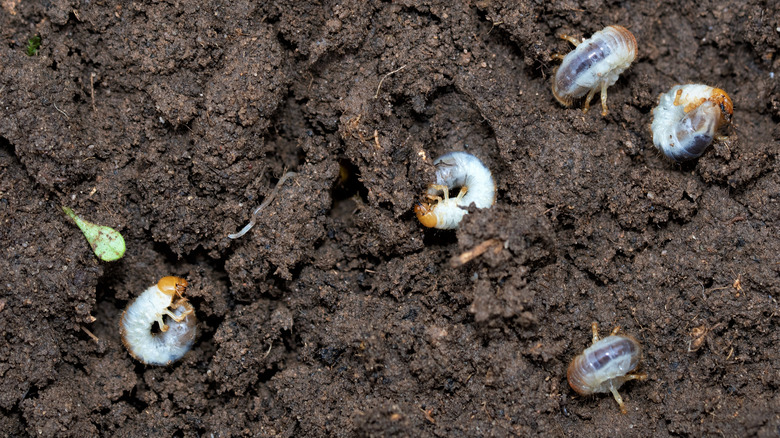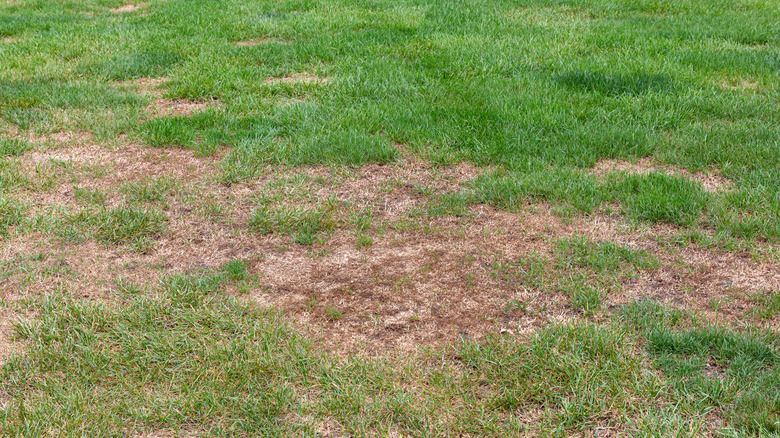Here's Why Your Grass Is Pulling Up Out Of The Ground (And What To Do About It)
When you notice your grass comes up too easily from the ground, you're likely dealing with overwatering, lawn grubs, or lawn diseases — each capable of loosening your grass's grip on the soil for various reasons. First, we'll start with overwatering, a surprisingly common issue. Too much water drowns your lawn, cutting off the oxygen supply to the roots and weakening the grass until it detaches from the soil. This often happens because of a leaking irrigation system or a failure to adjust watering schedules to account for recent rainfall. You can tell your lawn might be overwatered if the soil is soggy, walking on it feels spongy, or there's visible algae or moss.
Assess your lawn's drainage system to ensure proper drainage and combat overwatering. If water pools in certain areas after rain, consider aerating your lawn. Aeration involves creating small holes in the soil, which can improve water absorption and air penetration. Next, look into adding organic matter to your soil. Mixing compost or topsoil into your lawn can enhance its structure, improving drainage and nutrient retention. Installing a French drain or a dry well might be necessary for areas with severe drainage issues. A French drain is a gravel-filled trench that redirects surface water and groundwater away from your lawn. A dry well, on the other hand, manages excess water in a hole, slowly releasing it into the surrounding soil and preventing water from pooling on the surface.
Lawn grubs: the hidden menace
Lawn grubs, the larvae of various beetles, can be the unseen culprits behind your grass peeling away from the soil. These pests feed on the roots of your grass, severing the vital connections that keep your lawn anchored. The first sign of a grub infestation often comes when patches of your lawn begin to brown and die or when the grass lifts up too easily, similar to a loose carpet. This problem can escalate as birds, skunks, and raccoons, attracted to the grubs, dig into the grass for a feast, causing further damage.
You need to act fast and smart to get ahead of a grub problem. First, consider using milky spore, a natural bacterium that targets and eliminates grub populations. You may need multiple applications annually over 2 to 3 years. This effort is worth it, as milky spores establish themselves in your soil and act as a natural deterrent against grubs for 15 to 20 years.
You can also use neem oil or its derivative, azadirachtin. These natural remedies disrupt the grubs' life cycle and deter them from infesting your lawn. Neem oil, in particular, serves as an effective insecticide that is safe for the environment and non-toxic to beneficial insects. Lastly, it helps to adjust your lawn's watering routine. Grubs thrive in moist conditions, so limiting the water your lawn receives can make it less hospitable to them. Aim to water your lawn deeply but less frequently.
Battling lawn diseases
When you notice your grass detaching from the soil, it's often a sign of lawn diseases, which various fungi and pathogens cause. Among these, brown patch and pythium blight stand out as common culprits. Brown patch shows up as circular patches of brown, dying grass, sometimes surrounded by a ring of healthier green grass. It loves the heat and humidity, and too much nitrogen fertilizer worsens things. Pythium blight, meanwhile, gives your grass greasy, dark patches that can quickly spread under warm, wet conditions. Both of these diseases cut the grass off from its roots, making it easy to pull up.
Dealing with these diseases isn't just about applying chemicals. You've got to start with the basics: increase air flow, cut back on shade, and adjust your watering to keep the soil from getting waterlogged. If the disease has taken a firm hold, you should use fungicides. But remember, fungicides are most effective when they're part of a broader strategy that includes taking good care of your lawn's overall health and making it more resilient against future outbreaks. However, diagnosing the specific problem can be tricky with the myriad of lawn diseases. That's why it's a smart move to call in a professional. A lawn care expert can pinpoint the exact disease affecting your lawn and recommend the best treatment plan.


